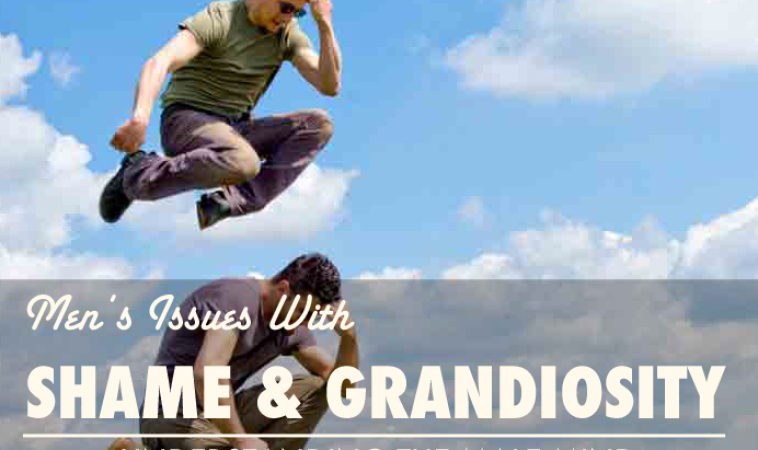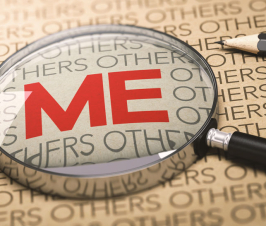Dr. Steve Rissman, ND
@StevenMRissman
I’ve been helping my son with his math homework the last few days. Do you remember >, <, or = in math? I recently heard a presentation by Terry Real, author of “I Don’t Want to Talk About It”, a well-known text on depression in men. The talk was about men’s tendency toward “greater than” or going “one up” on the other guy, also known as grandiosity.
The delusion that one is “greater than” the other guy, feels darns good and may provide a clue as to the etiology. I always think of the Taoist symbol of yin and yang to understand this a bit. When one part is small, the other is big. Terry Real says that grandiosity is the typical reaction of men to shame, so carrying my thought that when one feels small due to shame, another part self-aggrandizes to inflate a sense of balance. Others, and more commonly women, tend to go “one down” in the face of shame.
Compensation
At some point in life, if a boy was made to repeatedly feel “less than”, a logical compensatory mechanism would be to find ways, especially later as a man, even if delusional, to feel “greater than”. Since it feels good to find a place to “measure up”, there is very little motivation to change this attitude/behavior. This is why it can be tricky working with men who tend to go “one up”. Grandiose men don’t believe they have a problem and they certainly don’t come in to seek help! We tend to see wives, partners or parents whose lives are impacted by the grandiosity, or men who have unknowingly destroyed their relationships, even their lives, due to the unhealthy dynamic that gets created.
Many theories abound regarding etiology of grandiose tendencies. Some believe it is a necessary developmental stage, and Otto Kernberg, MD, known for his publications on borderline and narcissistic personality, sees grandiosity as a pathologic merging of the idealized parent with childhood feelings of being “all good” and without balance of good/bad.
Implications
The problem with men feeling “greater than” is that it implies that the other is “less than”, which creates behavioral attempts to belittle the other and make very selfish choices. The grandiose man has poor judgment because of the skewed perspective. Relationships, therefore often end in demise because of the lack of congruence, mutual respect, and intimacy.
Where there is no congruence, there is little ability to show vulnerability, where real connection is made. And without congruence, there is no “like to cure like”, no similar. I can’t help but think that the philosophy of homeopathy would have application here. The cure may very well lie in the simillimum, whereby there exists true empathy for perspective of the other. Years back, in learning the concept of simillimum from Jeremy Scherr, he suggested an exercise that may be of some benefit here. He said that the next time we were in direct conflict, to become as “similar” to the other as possible- mimicking body position and gesture, aligning with the argument of the other in every way possible. He proposed that it would be impossible to maintain stalemate and separation, and I’ve found it has proved to be the case.
It brings to mind the American Indian proverb of walking a mile in another man’s moccasins. Getting grandiose men to the vulnerable position of feeling the pain of others, is the place to start. Not “greater than”, not “less than”, but “equal to”.
*****
 Dr. Steve Rissman is a full-time associate professor in the Department of Health Professions at Metropolitan State University of Denver, teaching in the Integrative Health Care program. He teaches Clinical Pathophysiology, Men’s Health, Men Across Cultures, Men and Anger, and several other classes. Dr. Rissman has studied, taught and worked in the field of men’s health for over twenty years and has lead the way in lighting the path for young men embarking on the journey to better know themselves. In a new facet of his professional life, Dr. Rissman is the primary investigator in a research project looking at qualities of great men- men who know their purpose in life and hold a larger vision for what is possible.
Dr. Steve Rissman is a full-time associate professor in the Department of Health Professions at Metropolitan State University of Denver, teaching in the Integrative Health Care program. He teaches Clinical Pathophysiology, Men’s Health, Men Across Cultures, Men and Anger, and several other classes. Dr. Rissman has studied, taught and worked in the field of men’s health for over twenty years and has lead the way in lighting the path for young men embarking on the journey to better know themselves. In a new facet of his professional life, Dr. Rissman is the primary investigator in a research project looking at qualities of great men- men who know their purpose in life and hold a larger vision for what is possible.
In his practice on his farm, north of Denver, Dr Rissman works with men/boys confounded by behaviors related to anger/rage, anxiety, and depression in their lives.
Having grown up on a farm and spending a great deal of time in the outdoors, Dr. Rissman has a deeply rooted curiosity for the laws of nature, particularly the science of disease process. Consequently, he has an extraordinary ability to illicit the story of one’s unique dis-ease process and to perceive what needs to be cured in each individual man/boy, using psychotherapy, botanical medicines, therapeutic nutrition, homeopathic medicines, and other insightful methods intended to help lead men through the abyss of dis-ease toward a rich, purposeful life.

















